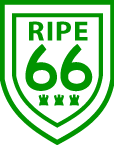Daily Meeting Report
504 attendees checked in so far!
Address Policy Working Group
Emilio Madaio, RIPE NCC, updated attendees on policies from the RIR communities. Andrea Cima, RIPE NCC, presented a report on the RIPE NCC’s recent work in Registration Services and received helpful input from attendees on several issues. Gert Doering, Address Policy Working Group Chair, updated attendees on current policy proposals. Tore Anderson, Redpill Linpro, then presented “2013-03 No Need – Post-Depletion Reality Adjustment and Cleanup” and explained the benefits of his proposal. APNIC and ARIN staff shared their experience with inter-RIR transfers.
Database Working Group
The session began with an update from the RIPE NCC’s RIPE Database Manager, Kaveh Ranjbar. The main developments include: a complete redevelopment of the whois backend that was finished in Q1 2013; the RIPE Database code is now fully available as open source; object history is available for non-personal objects; and an upcoming integration of RIPE NCC Access to maintain objects.
RIPE NCC Services Working Group – Sessions I and II
Several interesting issues were discussed in the session. One was looking at the way RIPE Policy documents are stored and labelled on www.ripe.net. It was suggested that a small group propose how the RIPE NCC could improve the process. The discussion then moved to “Publication of Sponsoring LIR for Independent Number Resources”, presented by Nick Hilliard from INEX. One of the big questions was whether it was enough that the RIPE NCC holds this information or if it should be publicly available through the RIPE Registry.
Randy Bush, Internet Initiative Japan, and Axel Pawlik, RIPE NCC Managing Director, mounted the stage while holding hands to demonstrate a new relationship that, if not physical, was at least professional. They gave a shared introduction on “RIPE NCC Services to Legacy Resource Holders, Resource Certification for non-RIPE NCC Members and the Provision of RPKI for PI Address Space”.
Niall O’Reilly, University College Dublin, presented “RIPE NCC Services to Legacy Internet Holders”. Randy Bush then presented “RIPE NCC Services to PI Holders”. This was followed by a presentation by Erik Bais, A2B Internet BV, on “Resource Certification (RPKI) for Non-RIPE NCC members”. There was some debate, with Sasha Luck maintaining his opposition to RPKI. Randy Bush replied that the decision to use RPKI was up to the individual but that policies should not be made that restrict his ability to use tools in his toolbox.
The second session began with a “Report from the RIPE NCC” by Axel Pawlik. Serge Radovcic, RIPE NCC’s Chief Communications Officer, discussed the RIPE NCC Survey 2013 and urged attendees to take part. Paul Rendek, RIPE NCC’s Director of External Relations, updated attendees on Internet governance and he was followed by a Registration Services update by Andrew de la Haye, RIPE NCC’s Chief Operations Officer. Mirjam Kühne, RIPE Labs Community Builder, shared the new RIPE NCC Roadmap prototype and encouraged everyone to give input via RIPE Labs.
DNS Working Group – Session I and II
Stephan Rütten, SIDN, gave a presentation on the impact of recent attacks and the measures they took was well received. People responded very positive to Peter Janssen, EUrid, and his presentation, “Dynamic Zone Provisioning in YADIFA”, which included a live demo of this new way of using DNS packets to provision DNS services.
In the second DNS session, Anand Buddhdev from the RIPE NCC gave an update on the status of DNS services and gave a preview of the new DNSMON functionality that will be offered based on the RIPE Atlas infrastructure. This was followed by Niall O’Reilly’s short ENUM update. Next, Patrik Fältström, Netnod, gave a repeat of his “Fun with TLDs” lightning talk which he presented in the Plenary session earlier in the week. Lastly, a very detailed presentation was delivered by Matt Larson from VeriSign, outlining an analysis of query traffic to .com/.net name servers.
IPv6 Working Group – Session I
The first session of the IPv6 Working Group had a list of very interesting presentations that attracted some good discussion between the presenters and the audience. The presentation by David Taht, “Fixing Bufferbloat with OpenWRT”, was especially well received. He discussed a project in which he and his colleagues built a home router that solves a number of open issues still present in many other home CPEs. His comment, however, that he wouldn’t like to expose this product to “your women and children” (because it is still a research project), was answered by Vesna Manojlovic, RIPE NCC, who said even though she liked the project, she would like to help him expose it to more women and children, which was welcomed by a long applause and a lot of laughter.















